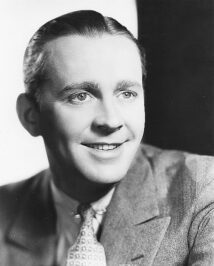James Dunn
James Dunn worked on the stage, in vaudeville and as an extra in silent movies before he was signed by Fox in 1931. His first movie with Fox was 1931's Sob Sister (1931). While at Fox, he appeared with Shirley Temple in her first three features: Baby, Take a Bow (1934), Stand Up and Cheer! (1934) and Bright Eyes (1934). Dunn's screen character was usually the boy next door or the nice guy. In 1935 musicals at the new 20th Century-Fox were out and Dunn would move to the "B" list, from which he would never return. In The Payoff (1935) he plays the nice guy newspaper columnist whose wife ruins his career. By the late 1930s he was drinking heavily and became unemployable. He would appear in small roles in films during the early 1940s, but those parts were few and far between. In 1945 he was able to make a comeback and won the Oscar for Best Supporting Actor in A Tree Grows in Brooklyn (1945), but his rejuvenated career would not continue. By 1951 he would again be unemployed and bankrupt. Television would later supply some work and he would be a regular on the series It's a Great Life (1954). Versatile actor of stage, screen and television, James Howard Dunn was the only child of a prominent New York stockbroker and homemaker. He grew up and attended public schools in New Rochelle, New York. Dunn's interest in pursuing a career in acting became apparent when he started playing hooky from high school, preferring to work as an extra in various studios scattered throughout the city. His father, Ralph, had different ideas for him and took him into his brokerage firm as a security salesman. However, Dunn continued to moonlight as an extra or in small parts whenever he had the opportunity. In 1927, he had a bit part in the Broadway play "Nightstick", so he could always claim his career started on Broadway. For three years he honed his acting skills in stock companies in Englewood, New Jersey and Winnipeg, Manitoba. He had gotten down to one suit and hadn't eaten in three days when he was given the opportunity to make a screen test. As a result he was awarded a long term contract with Fox studio. His big break came when director Frank Borzage chose him to play the young newlywed in "Bad Girl". He received outstanding reviews from the critics and became a star, virtually overnight. In 1934, he helped introduce film audiences to Shirley Temple as he sang and tap danced with her in her first major picture, "Stand Up and Cheer". That same year he also appeared with her in "Baby, Take a Bow" and "Bright Eyes". Between 1931 and 1935, Dunn made over 20 pictures for Fox and a few more on loan out. In 1935, Fox merged with Twentieth Century and bought out Dunn's contract. His career soon began to wane as he was forced to work freelance. At the same time, Dunn was becoming increasingly dependent on alcohol, earning him a reputation as an erratic, irresponsible performer, further diminishing his employment prospects. His decline from top box office draw to B movie actor was almost as startling as his meteoric rise to fame had been. Nevertheless, he usually managed to keep working, whether it be on stage, in radio, or in low-budget "poverty row films." In 1945 Dunn was given a second chance at movie stardom when young director, Elia Kazan chose him for the role of "Johnny Nolan" in "A Tree Grows in Brooklyn". His sensitive portrayal of the gentle, alcoholic father earned him the Academy Award for Best Supporting Actor. The award, however, failed to reignite his movie career and he made few substantial films after that. One notable exception was 1947's "Killer McCoy", starring Mickey Rooney, in which he again played the role of a ne'er-do-well, but sympathetic alcoholic father. With the advent of television, new opportunities opened up for Dunn, as he appeared in literally scores of productions during the '50s and '60s. He acted in most of the classic anthology series such as "G.E. Theater and "Playhouse 90", and guest starred in many of the most popular series of the era, including "Route 66", "The Fugitive" and "Ben Casey". Between 1954 and 1956, he starred in the sitcom, "It's a Great Life", as the irascible Uncle Earl. The show also featured Frances Bavier, as his long-suffering sister, Amy Morgan. Dunn continued to work in television, almost up to the time of his death in 1967. He is one of the relatively few actors to have two stars on the Hollywood Walk of Fame, one for motion pictures and one for television.

